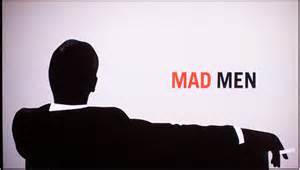As Mad Men, the most profound series in TV history, draws to a prolonged denouement, we are treated to a tidy cavalcade of cameos of former regulars shuttling through the Sterling-Cooper-Draper-Pryce-McCann-Erickson-yadda-yadda misogynistic ad world. Former friends are now enemies. Meamwhile, the truly egregious boors -- still the mainstay of the big-name ad world -- are running the show, as Peggy and Joan (and eventually Stan?) discover to their differently sized dismay.
Meanwhile, Don's forlorn odyssey through his romantic past rings necessary and true. He's chastened. He's sad. He's lonely. So sad, chastened and lonely, that he is willing to bestow all the goodness and compassion he didn't quite bestow on all his previous conquests on a seemingly random waitress he spies in a diner. At first, it appears as if genius show runner Matthew Weiner was up to what Vince Gilliam pulled off towards the end of Breaking Bad around what or who poisoned little Brock. That is, blowing up a secondary moment from a previous season into the signature trope that gives a series its rounded emotional core.
However, the semi-spectral waitress Diana (no last name given), whom Don thinks he knows from somewhere, is just a real-life amalgam of competing desires within him. A longing for a wounded, sad brunette vaguely resembling his stepmother Abigail, whom young Dick caught in flagrante delicto with sleazy brothel owner Uncle Mack? Or his own mother, who died in childbirth? A classy, but mournful, true companion along the lines of fellow outsider, Jewish shopping store maven Rachel Menken, whose mother also passed away in childbirth and who herself has since passed away from leukemia?
Don goes to the shiva for Rachel, only to be turned away by Rachel's prickly sister (and surrogate mother) because Jewish wannabe Don isn't Jewish or wanted.
Then there's the possibility that the new woman in Don's life simply represents a mature sex buddy along the lines of Don's neighbor Sylvia Rosen, whose shown with Don and Di in an elevator with her now drunk and heartless cardiologist husband Arnold.
For this new, repentant Don, she's probably all this and more, including, like Don, a refugee from two-car-garage suburbia (and the Midwest to boot).
There's something Shakespearean about Don's tour-de-regret, as if he is a ghost passing over the lives of people that he never bothered to deeply know because he was too busy bedding down the latest flame in a compulsive, sex-addicted quest to quell the sadness of his bred-in-bordello childhood. All the women that pass through Don's long goodbye are aspects of his own id; each important in their way, but fully, on their own, not enough.
There was never a woman who could be all that Don Draper needed in a mate. And each of his conquests knows this and hates him for it. Even though compared to some of the other more gauche boys in Don's manly orbit -- the formerly likeable, now creepy, Harry Crane is shown crudely hitting on Megan Draper -- what he has done to these women does not merit the treatment he is receiving in return.
However, that is the deeper "No Exit" point of Mad Men. There are forces at work in life greater than oneself -- whole histories of pain and suffering, as well as inherited beliefs and ideologies -- that predestine one's trajectory. In 2015 America, we just want Don to get sober and into therapy, but, for the true oversoul, pedestrian palliatives will not suffice.
At the beginning of episode 9, "New Business," Don is making a milk shake for his sweet son Bobby and second son Eugene. He seems at that moment to feel the greatest pull towards Betty Francis (the former Betty Hofstadt Draper). And rightly so since she was his first wife and the mother of his three children. Moreover, you see in the still child-like Betty that winsome desire to earn Don's approval, and to gain some lebensraum for herself amidst the claustrophobic ennui of her politician-wife milieu. Betty is going to get a Masters in Psychology. "People love to talk to me," she smiles.
There is something tragic about both Don and Betty at that moment, which suggests, in the end, they were meant for each other: both in love with the façade, yet capable of bringing out the depths in others, even as they struggle to mine their own. If only they could get out the Kodak carousel "time machine," and travel back to that delightful summer camp episode with Bobby, when they finally seemed happy.
Yes, Betty Francis will make a splendid therapist. And, yes, Henry Francis drank the rest of Don's milk shake in the show's best slam yet at the political class: sanctimonious towards Madison Avenue swells, but prostitutes all the same.
That whore metaphor from Don's childhood doesn't stop there, especially as Megan's sexy mom, Marie Calvet, demands that Roger Sterling bring over $200 in cash immediately to pay Megan's movers. Then Marie subsequently proceeds to demand that an always-frisky, always-hilarious Roger bed her down. These two pleasure-seeking creatures understand and deserve each other.
However, this is Don's story. And everyone else in Mad Men -- despite their own intriguing arcs -- exist as a reflection of what's up with our protagonist. Though he is still able to bring out a complex web of emotions in others, you want to cry for this broken and suddenly honest Draper. The man who had it all is now -- thanks to Megan's vengeful mom -- even without furniture in his groovy Manhattan bachelor pad. This coup de Quebecoise comes on the heels of Don gullibly writing a $1 million check to formerly decent, now empty vessel, Megan, who, even with her "Zoobie Zoobie Zoo" charm, has become more interested in her vapid soap acting career -- gifted to her courtesy of Don, and going nowhere since his departure -- than our antihero's true needs.
The tragedy of King Draper is that now that he is "ready" (as he tells "Di"), the tough new girl in his life reveals that she is not. She needs to suffer a bit more for her past misdeeds.
And so it goes. The heaping mess of karma, born long before Dick Whitman even entered this world, is still inflicting its vengeance on our late-blooming ad man.
What will Don do now? Where will he go? What will he become? Millions of similarly cuckolded men, born of Eros and of dust, and struggling with quandaries similar to those of our tragically flawed Achilles, are dying to know.

